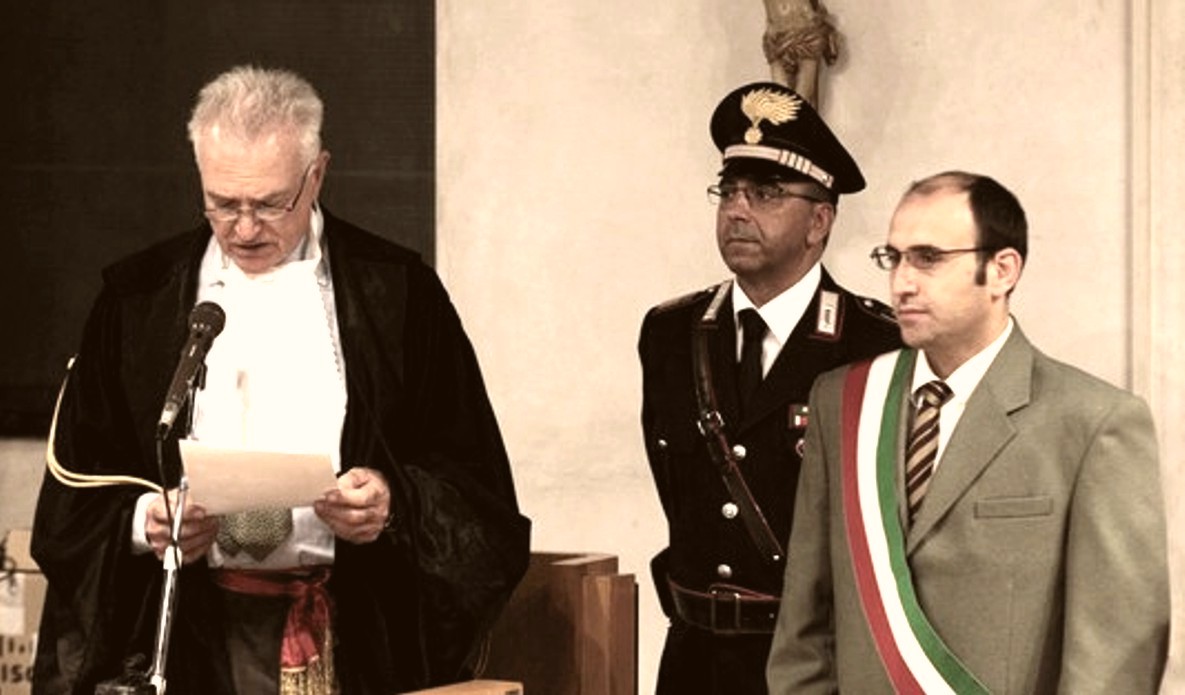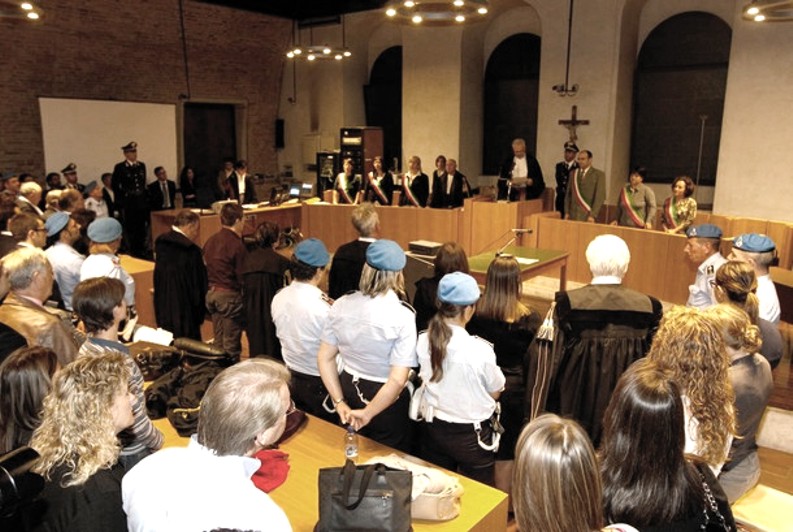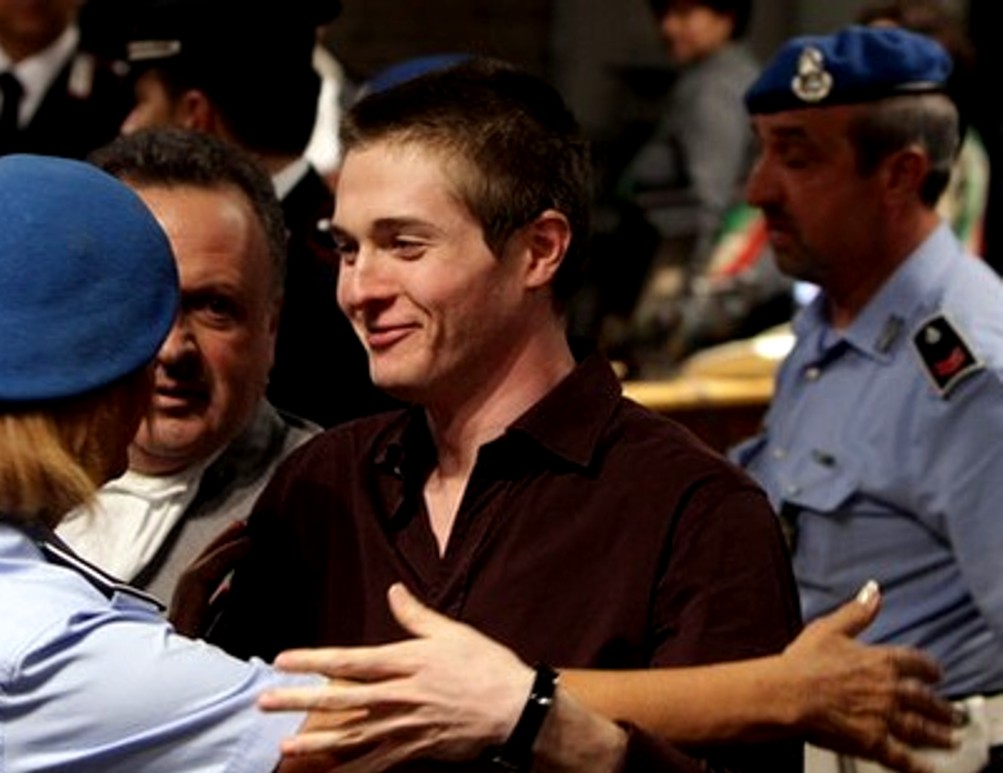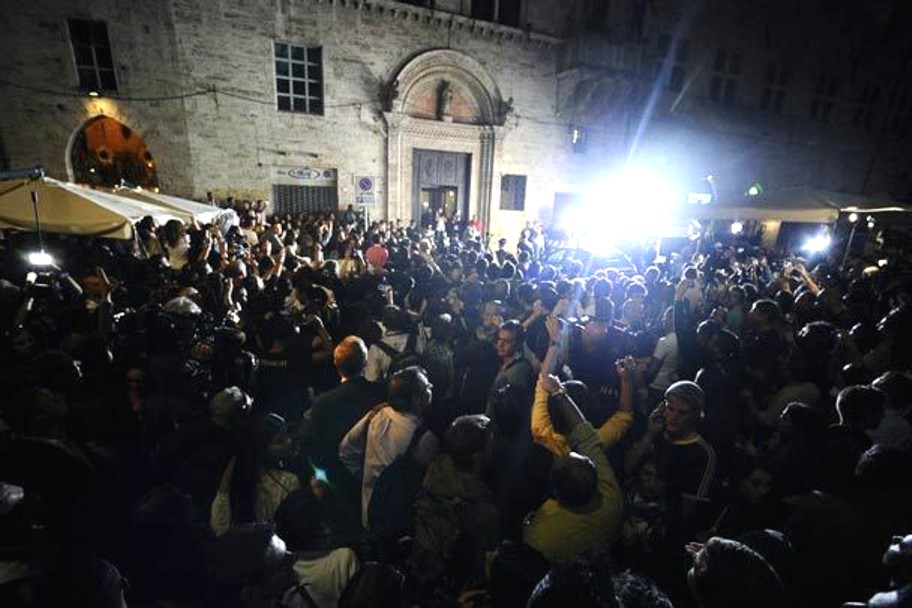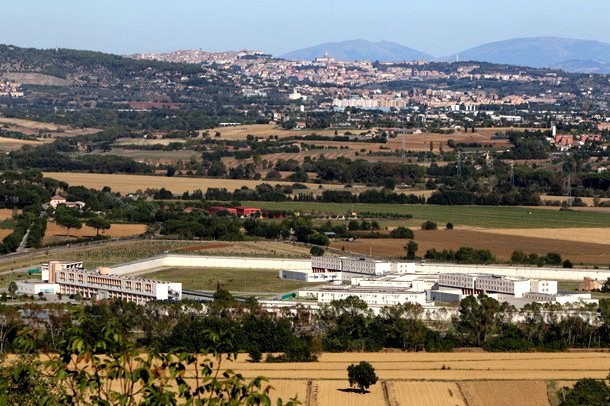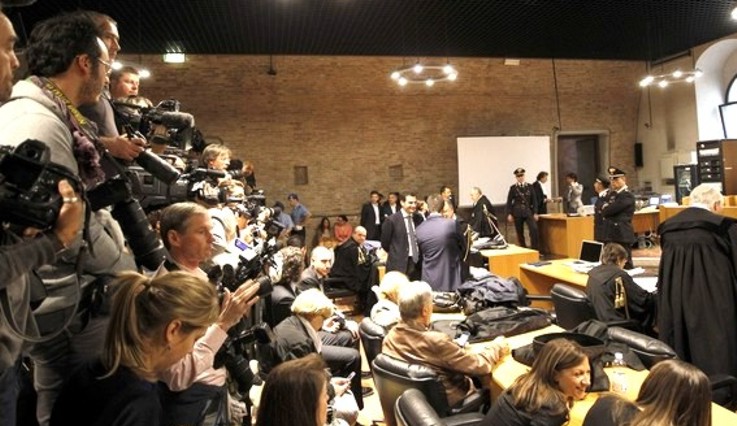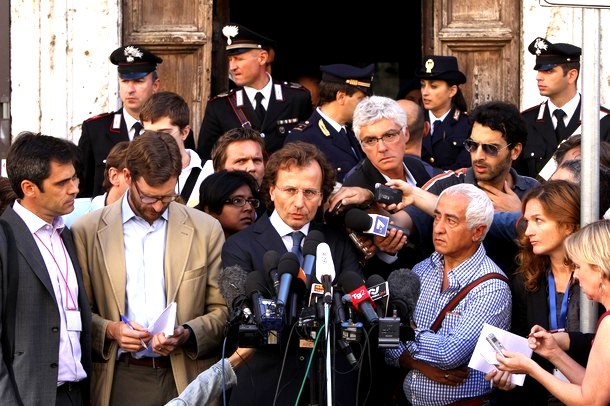
Wednesday, October 05, 2011
Understanding Yesterday’s Knox/Sollecito Verdict
Posted by Maundy Gregory
For those who have been reading my blog Maundy Gregory it will not come as a surprise when I say I am less then wholly satisfied with yesterday’s acquittal of Amanda Knox and Raffaele Sollecito.
I’m very much with the unruly mob shouting “shame!” outside the courthouse this evening. In spirit, you understand.
I don’t even believe this is a case where a court has erred with two left feet on the wrong side of the fine line between technical and reasonable doubt. I’ll not go into the detail of the evidence, since, over the next few days, that will undoubtedly be done thousands of times with greater inaccuracy than I could ever achieve. But perhaps it suffices to give the view that it is such that no acquittal could have been possible under normal circumstances.
It won’t be possible to know how the decision of the court was reached until it publishes its detailed motivation report. But I find it hard to imagine how it will make sense. The disheartening expectation I have, which I think others will share, it that it will offer the reasoning of a court that has crumpled under the pressure of a public relations campaign. A humiliating day for Italy.
And, of course, a heartbreaking tragedy if you are able to spare a thought for the Kercher family. Tomorrow, one of their daughter’s murderers will fly home to ticker-tape and a small fortune. Another, like the drummer in successful rock band, will take a smaller share of the royalties, but the proceeds, taking into account possible government compensation, may still be enough so that he is at liberty to choose whether or not he ever wants to work in his life or not. Merdith Kercher’s death seems almost reduced to the level of a smart career move.
Yesterday’s verdict will undoubtedly, however, be appealed. That’s more than a speculative exercise, since it does happen than people are acquitted at first appeal and then found guilty by Italy’s supreme court. But the focus of the second appeal will be much narrower, restricted only to questions of law and logic. Although that is construed fairly widely in the Italian system, what it means is that the decision of the appeal court can’t be corrected simply because it is wrong.
It will have to be shown to be legally unsound before any evidence can be re-examined. Until the motivation report from the appeal is published, it is impossible to say what the chances of the prosecutors succeeding in a further appeal might be.
The case, because it has had such a high profile, may have ramifications in Italy for two reasons.
Firstly, even though the reasons for the decision will not officially be known for a few weeks, it can be assumed that the court has rejected entirely the forensic evidence provided by the police. That’s not a small matter. As in most European countries, forensic testing in Italy is centralised, so an implication of the verdict may be that the entire forensic science set-up in the country is simply not fit for purpose or, at least, it wasn’t at the time of the investigation.
A modern forensic science service ought to be able to handle DNA evidence that, as in this case, comes from a very small sample or from an item that had lain in situ for some weeks without difficulty. The Italian police would undoubtedly claim that their forensic teams are as capable as any in the world. I’m not in a position to deny that. But, from a practical point-of-view, if the whole of the scientific aspect of a prosecution is capable of simply crumbling in court, it must be important to try to understand why that happened.
Secondly, reform of the judicial system in Italy is a very live issue, in no small part because Silvio Berlusconi stands accused of various crimes and so he has made judicial reform a priority. I think it is unlikely that Italian public opinion will be behind yestrerday’s verdict and it will be seen by many as an example of how Italian justice is far too lenient with defendants.
Personally, I think Italy should take caution before making too reactionary an interpretation of the Knox/Sollecito case. It may be fair to point out that Italian appeals can tend to be slanted so that the focus for live examination is selected aspects of the defence case, so that much of the prosecution case takes a back seat. And there may be some room for quibbling about certain evidentiary rules applied in the case (the exclusion from evidence of Knox’s false allegations against Patrick Lumumba, for example).
But the decision yesterday can’t just be about a systematic problem. The automaticity of appeals in Italy may indeed favour defendants. But, surely, a guilty person ought to remain guilty regardless of how may re-trials are granted.
If, like me, you’re disheartened by yesterday’s verdict, then I don’t really have much to offer by way of consolation, except the observation that justice is not always done and that’s something we have to live with. And at least you know, next time you kill someone, to think about who is going to do your PR before you think about who your lawyer is going to be.
Tuesday, October 04, 2011
The Guardian Publishes A Negative Take On Italian Justice Rather Poorly Researched
Posted by Peter Quennell
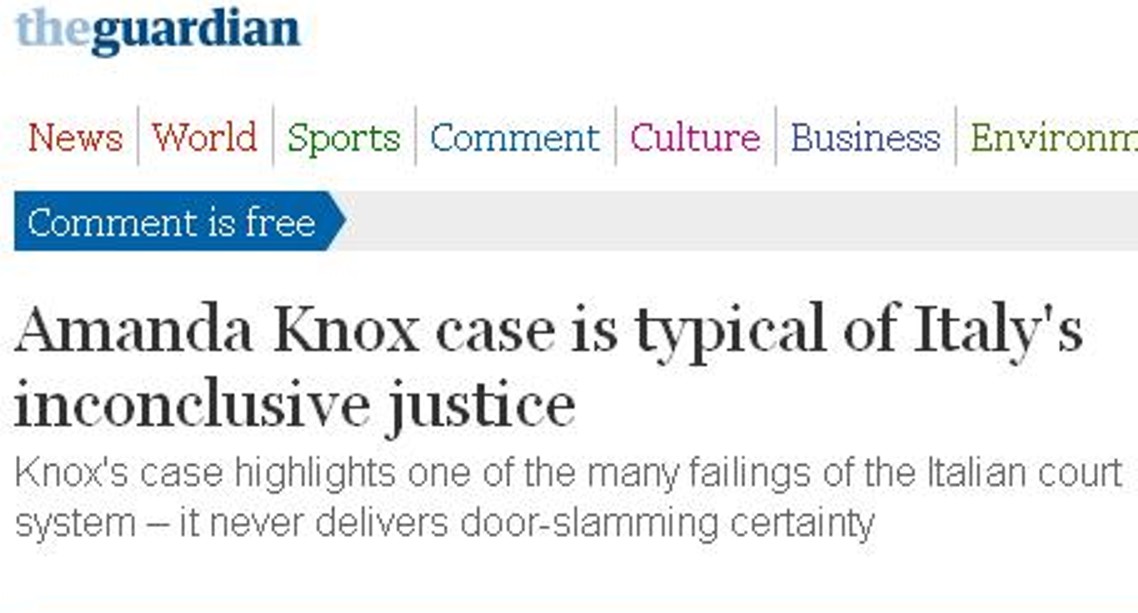
Click above for Tobias Jones’s take in the Guardian which seems to be trying to report evenly on the case..
Here are our most-read posts on first trials by Italian poster Nikki and the two appeals by Italian poster Commissario Montalbano and often-overlooked victims’ rights about Italian campaigner Barbara Benedettelli.
All explain better than Tobias Jones does the many hoops that prosecutors have to jump through for victims’ interests to come out ahead..
We can agree with Tobias Jones on this below - the elaborate, expensive and slow automatic first appeals complete with lay judges who don’t see the first pass of the evidence at first trial and often act as a wildcard in the process.
It’s one of the many failings of Italian justice that it never delivers conclusive, door-slamming certainty. What usually happens is that the door is left wide open to take the case to the next level, first to appeal and then to the cassazione, the supreme court. The score in the public imagination, at the moment, is simply one-all.
It’s always been that way. There’s barely one iconic crime from the post-war years that has persuaded the country that, yes, justice has been done: the murder of Pier Paolo Pasolini, the Ustica crash, the Bologna railway station bombing, the Piazza Fontana atrocity, the Monster of Florence murders, the murder of Luigi Calabresi, the “caso Cogne” “¦ none has ever been satisfactorily, convincingly resolved. Instead the country seems to split into innocentisti and colpevolisti (those who believe in the innocence or guilt of the accused) and the heated debates continue for decades.
But we’d agree less-so, at least from an American perspective, with the Italian uniqueness of this below.
Dietrologia ““ literally “behindery” or conspiracy-theorising ““ is a national pastime precisely because the courts don’t offer convincing verdicts. It allows every journalist, magistrate and barfly to try their hand. The result is that everyone with an active imagination has a go at explaining the truth behind the mystery, and inevitably the truth only gets further buried beneath so many excited explanations. The media plays an active role in keeping the circus going: in no other country are cronache nere ““ “black chronicles” ““ so much the mainstay of the evening news. There’s always a case on the go.
Tobias Jones should watch the urbane elegance of the Porta a Porta shows, which are reminiscent of human games of chess, and then visit the US and watch all the cable news channels devoting many hours a day to legal talking heads debating one another over high-profile crime cases. CNN and MSNBC could probably not survive without them (Casey Anthony was a godsend) and they go back to the OJ Simpson trial when it seemed half the country joined in.
He probably has a good point about subjudice (blackouts on court news in the UK) but there’d seem more chance of a wrong outcome driven by public opinion in the US with its elected judges and police chiefs and prosecutors angling for news exposure than in Italy. (Judge Michael Heavey is an elected judge.)
Local public opinion in the US is very much behind the high execution rate in several American states and the difficulties non-whites often have in getting off.
Media Reaction Commences: What Is It About Amanda Knox…
Posted by Peter Quennell

Media can be a fickle friend. Big bucks may now be dictating a U-turn. One early indicator?
We should be happy for her, the innocent victim of this terrible miscarriage of justice.
Yet there is something disquieting about Amanda Knox, something that slightly chills the blood. Those piercing blue eyes, as cold as the steel of the knife that slit Meredith Kercher’s throat, have hardly flinched during her court appearances.
Not since Lindy-the dingo-did-it-Chamberlain was cleared of murdering her baby has a woman so divided public opinion.
Amanda’s prison diaries reveal an astonishing calmness and self-belief. While most 20-year-old girls falsely accused of a vile sex murder would be in pieces, she was planning her 21st birthday party, right down to the guest list.
There is hardly a mention of the brutal murder of her friend in the bedroom next to her. It’s all about Amanda.
Even The Independent’s Peter Popham is pouring cold water on the parade. Helping to find “the real killers” may be a way to help stem this tide.
Monday, October 03, 2011
Knox And Sollecito Declared Not Guilty But With Angry Booing Outside The Courtroom
Posted by Peter Quennell
Van Watch: Around 8:00 PM Perugia Time And The Vans Are Reported Still At Capanne
Posted by Peter Quennell
The BBC and other news services are keeping a close eye on the gates of Capanne Prison.
When the vans carrying Sollecito and Knox exit and head back for Perugia (at the top of the massif in the shot below) the judges and lay judges will have something to announce.
Added: the two blue vans are on their way back to Perugia from Capanne and they should be arriving at the court about now. The defendants may enter at the level of the street tunnel that runs right under the court. If so then they walk up or catch an elevator.
When they were found guilty in 2009 they exited that same way. The court is one level below street level but if the windows had clear glass in them the views to the east would be terrific. The court is NOT underground as some of the media commentators have claimed.
Twentieth Appeal Session: Translated Transcript Of Amanda Knox’s Final Plea To The Court
Posted by Peter Quennell
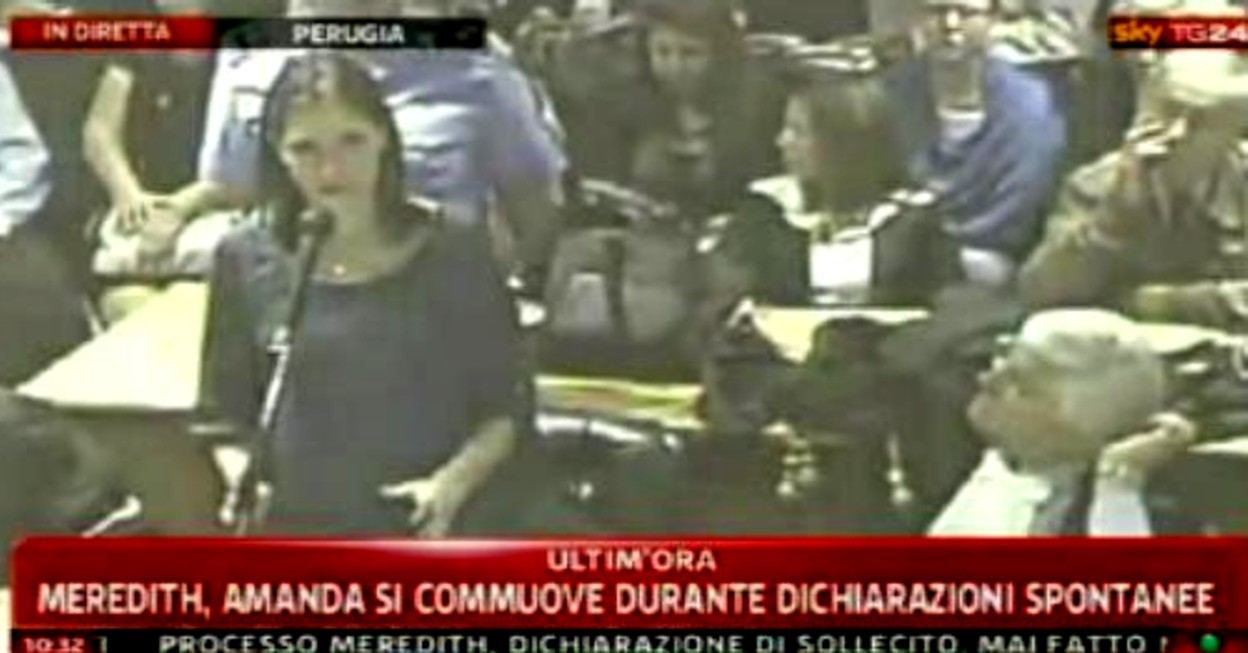
The image above and Knox’s remarks below are from one of the live broadcasts of the pressroom feed.
Members of the court. Many times people have said I am some other person, people don’t understand whom I am. The only thing different from four years ago is what I have suffered. I lost a friend, a girlfriend, in the most brutal way in the most unexplained manner.
My trust in the police authorities has been betrayed. I have had to dealt with unfair and unfounded charges. I have paid with my life for things that I did not commit.
Four years ago I did not know what tragedy was. I have never faced so much anger before. I didn’t know how to interpret it. How did we react when we found out Meredith had been killed? I did not believe it. How was it possible?
Her bedroom was next to mine. She was killed in our home. If I had been there that night I would have died. The only difference is, I was not there. I trusted the police’s sense of duty and trust. I trusted them completely. I was betrayed on the night of November 5. I was manipulated.
I am not who they say I am. I am not violent. I don’t have a lack of respect for life. And I did not kill. I did not rape. I did not steal. I wasn’t there at the crime scene.
I had good relationships with everyone who lived in my flat. We all had good relationships. We helped each other. I shared my life, particularly with Meredith. We were friends. She was worried about me. She was very kind to me.
I have never run away from the truth. I insist after four desperate years, that our innocence is true and needs to be recognized. I want to go back home. I want to go back to my life. I don’t want my life and my future taken away from me for something that I didn’t do.
I am innocent. We do not deserve this. We never did anything to deserve this. I have the utmost respect to this court and the care that it has shown. Thank you.
Twentieth Appeal Session: Inside The Court This Morning Before The Procedings Started
Posted by Peter Quennell
Twentieth Appeal Session: The TV Media Assembled At Front Entrance Of The Court Today
Posted by Peter Quennell
Is The Raffaele Sollecito Defense Team About To Separate Him From A Radioactive Amanda Knox?
Posted by Peter Quennell
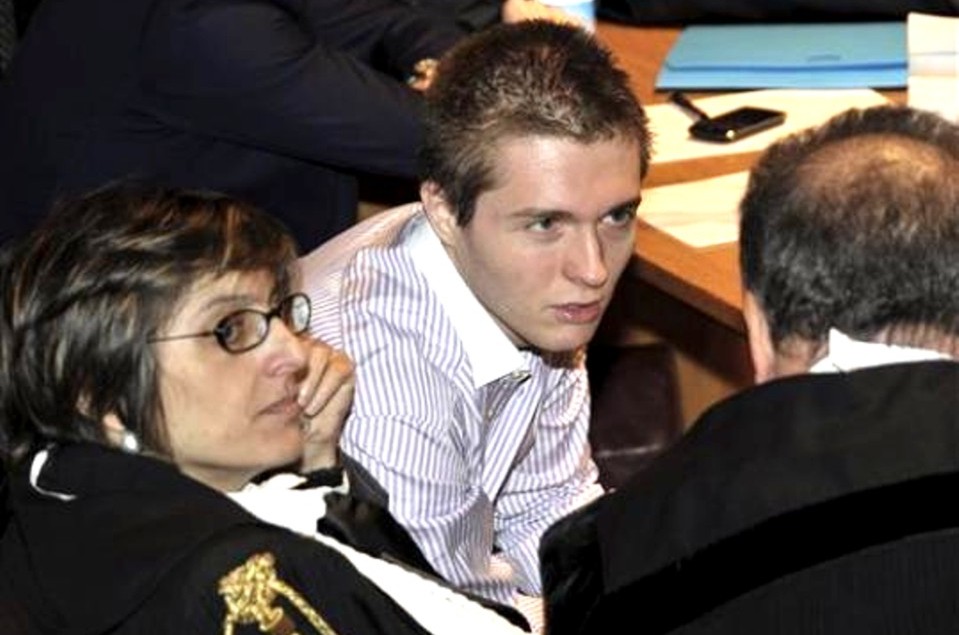
Sollecito has at least five advantages over Knox in what may be the final day of court tomorrow.
First, the smartest and most influential of all the lawyers in MP Giulia Bongiorno. Second, a relatively attractive family which has run a low-key smiling campaign. Third, relatively little evidence (the bra clasp and footprint) placing him at the scene of the crime and unlike Knox no alibi that says he was there.
Fourth, no obvious motive for either the murder or the cleanup compared to the many possible motives for Amanda Knox. And fifth, a weak wishy-washy personality on which Bongiorno has already played, casting Knox as the lead player in the drama and Sollecito as either accidentally there or not at all.
The mood does seem to be moving against Amanda Knox now as the extreme arrogance of the million dollar campaign sinks in. And if her “spontaneous” remarks to the court tomorrow follow her usual pattern, they will yet again make her look callous and concerned only about herself.
Several reports are out now in Italian harking on these themes. This report by the Associated Press with a possible nudge from the Sollecito team gives a sense of what the Italian reports are saying.
Even in Sollecito’s native Italy, it is Knox who commands the most media attention. Two prominent celebrity and gossip magazines, “Oggi” and “Gente,” put Knox on their covers during the final week of arguments in the appeals trial, and newspapers characterize him as being in the background.
Not even prosecutors have portrayed Sollecito as the main protagonist in the murder of Meredith Kercher on Nov. 1, 2007. According to their version, Sollecito held Kercher from behind while Knox stabbed her and another man tried to sexually assault her. Ivorian immigrant Rudy Guede was convicted in a fast-track trial and saw his sentence cut from 30 years to 16 years on appeal.
Attention during the investigation focused intensely on the two young female roommates as the world and prosecutors searched for a motive. Knox was portrayed as sexually promiscuous and lacking inhibition, while at the same time working hard to support herself and trying to learn Italian; Kercher was depicted as more serious and studious, who had at the end of her life began to chafe at her American roommate’s sloppiness.
The good girl/bad girl dichotomy drove headlines across the globe, while Sollecito “” the mild mannered boyfriend “” was largely overlooked in a supporting role.
It’s a role that his defense lawyer plays up. Sollecito is the son of a wealthy doctor from southern Italy who hired a crack legal team to defend his son. It’s led by Giulia Bongiorno, who defended former Italian Premier Giulio Andreotti on charges of mafia association.
“It’s not by chance that Raffaele arrived in this trial as the boyfriend. Nothing connects Raffaele to the crime,” Bongiorno said in her closing arguments last week. “With a girlfriend, you usually get a family. Raffaele got a murder.”
She said the few pieces of evidence in the “Amanda-centric” trial relate to Knox, not to Sollecito. “Nothing connects him to the crime,” Bongiorno said.
Million Dollar Campaign And American Media Come Under Intense Ridicule By An Influential Italian
Posted by Tiziano
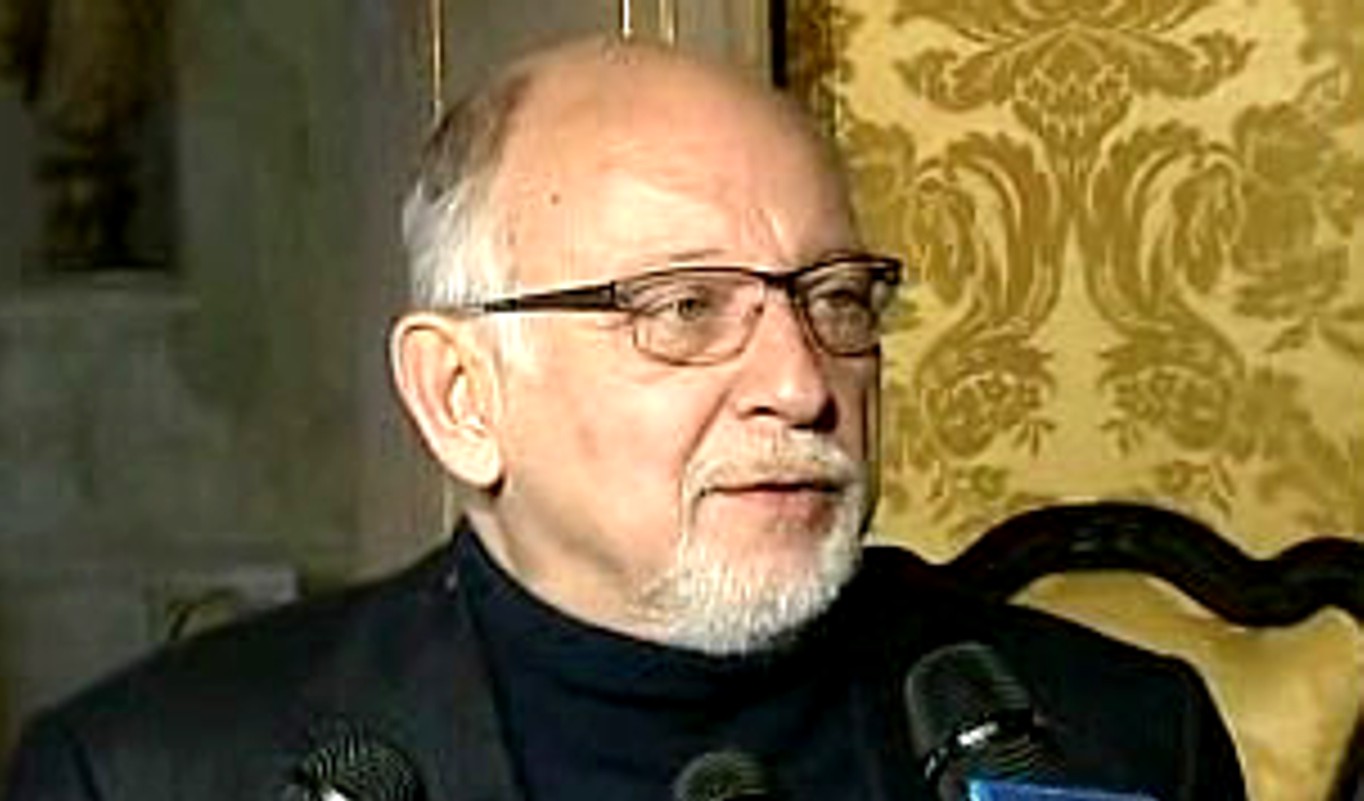
Vittorio Zucconi is the US editor of the major daily La Republicca and lives in Washington. He has more influence over Italian perceptions of America than any other. This is translated from the Italian.
A few hours from the verdict, America is in a trance over Baby Amanda - she is the girl from the golden west, an innocent victim of the wicked witches of the east, the ones wearing the robes of the Perugian judges - now awaiting the happy ending that everyone is expecting, which legions of correspondents and American TV cameras talk about and recount, as if the fate of the west depended upon her release from prison on appeal or on the confirmation of the guilty verdict
By Vittorio Zucconi per la Repubblica
She is the “Girl from the Golden West”, the innocent victim of the wicked witches of the east, the ones who wear the robes of the judges from Perugia. It is a melodrama, sung, played and staged for an American audience which relishes it and avidly follows it like a soap opera or one of those legal thrillers which have made the fortune of of authors like Grisham, Turow and before them Earl Stanley Gardner.
Amanda like Puccini’s Minnie, is the snow-white, naive, extremely innocent girl imprisoned on the wild frontier of the Italian justice system, now awaiting the happy ending which everyone expects, which legions of correspondents and TV cameras tell of and which are preparing to recount as if the fate of the West depended on her release form prison on appeal or on the confirmation of her guilty verdict. And which networks like the ABC are already selling for $7.99 to be downloaded to I-pads and tablets.
Such a show of strength, such a shelling out of money on the part of “news organisations”, all now very careful down to the last cent in bad times, about a legal case the like of which has probably not been seen on the other side of the Atlantic since the trial of historic importance of Adolf Eichmann.
Yes, the monster of the SS, the brain and the accountant of the Jewish genocide. Live satellite coverage is expected for the imminent sentence to be pronounced by the Appeal Court and daily services will broadcast, especially those for the morning shows, those desperate housewives, for mothers who have children anxious to escape from the boredom of suburbia, the same old routine of high school parties to fly far away for new experiences, as Amanda dreamed.
The one whom the British tabloid press straight away stained with the nick-name given to her by her soccer team friends, in the football she played as a little girl: Foxy Knoxy, in which foxy means agile, cunning, escaping tackles and not for that “foxy” which, as in Fellini’s Amarcord evokes the arts of an enchantress and insatiable desires. Because while the USA was barracking for Knox, the English cousins were against her.
As well, other than those irresistible ingredients thrown into the cauldron of the morbidity which gains circulation and titillates the worst in every consumer of garbage TV with bombs and horror reconstructions, sex, blood, satanism, the woman with sacrificial lamb and the butcher, in the fury of the American media who throw themselves against this “court peopled with provincial lawyers” (still Rolling Stones which dedicated an extremely lengthy inquest) there is a great repressed and secret desire for vengeance.
There is the repressed rage against that Europe which is always ready with finger raised to accuse American justice of monstrous errors, of inexplicable acquittals (the O J Simpson case), of “puritanical” persecution as is said precisely on our shores, (Clinton crucified for oral sex), of horrible shows, like the arrest and the world-wide shame of Strauss Khan, or the details of the “panties cover-up” - inside or outside? - of the victim of Willy Kennedy Smith, raped on the beach of the Kennedy villa in Florida.
American justice which triumphantly boasts that it is the best in the world, but refuses to recognise that it has sent, and still sends, innocent people defended by useless bar-room lawyers to be executed.
Now swallow this, you supercilious and presumptuous Italians and Europeans. The frenzy of the specials about Amanda is pursued by the satellite nets which have to recuperate their expenses.
CNN, once the authoritative queen of the satellite, yesterday showed a long special on the four years of torments and injustice, with Amanda on show on the site, with her face in the shadow, her fresh-face and prison profile, the “girl next door”, quite different from the she-devil, the satanic female painted by the “baroque” closing arguments (here is another expression which appears in all the reports on the prosecutor, next to “mediaeval”, all that is missing are the Borgias and Machiavelli.)
On the site her face figures in double format in respect to the pallid and sinister image of the jihadist Anwar al-Awaki, killed yesterday, one of the infinite number of aspiring candidates for the succession of Osama Bin Laden. The number of listeners and hits motivates CNN: Amanda is in first place and is beating the terrible terrorists, as well as news on the economy and the stock market, disastrous again.
We are possibly on the way to a second recession, but there is no match, in the ratings, for that travesty, that parody of justice, put in place against the girl from the golden west, martyred in Perugia.
It is a thought that will print books, burn DVDs, work video-recorders to see once more the specials of CNN, Fox, ABC, CBS, MSNBC, local broadcasters, which have exalted as a hero, the blogger from Perugia who was sceptical from the first day. And the first network which succeeds in obtaining - or buying - the truth from Amanda, the “accidental murderer” who was dreaming of the view of Umbrian cypresses and who saw the prison bars of Italian justice, will be transported to the stars.
‘Is it true that you are always dreaming of sex?” the prison guards would ask the girl, according to her diaries, also printed greedily by Time. True, false, it doesn’t matter. Amanda is a victim, a woman, a little girl, and the verdict has already been issued here. An America, year in year out accused of being an executioner by anti-Americanism, even when its own symbols are collapsing, can finally call itself, this time, the victim. Today, here, we are all Amanda.Knox.

